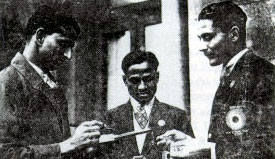The World's Hockey Champions 1936
By Olympic Gold Medallist M. N. Masood
|
Page 1 |
Page 2 |
Page 3 |









 |
Page 4 |
Page 5 |
Page 6 |
Practice Matches
in Northern India
| The excitement of Delhi's citizens at
this unexpected victory, the immense joy of her players and the pride of her selectors
may better be imagined than described.
The news of the defeat flashed through India and even abroad, where the
Germans and the Dutch, our closest rivals in Berlin, were keenly watching every
activity of the Indians. It seemed that the Indians were not invincible after
all.
|
|
Page 7 |
Page 8 |
Page 9 |
Page 10 |
Page 11 |
Page 12 |
 he Indian Hockey Federation communicated to all the affiliated associations
in the first week of June, and also published an announcement in the various
newspapers of India, that funds were at last available to send an Indian hockey
team to Berlin, where the Olympic Games would be held. To compete in the Olympic
Games, defend the very proud title of world champions, and see Europe - could
anything look brighter to us in the world?
he Indian Hockey Federation communicated to all the affiliated associations
in the first week of June, and also published an announcement in the various
newspapers of India, that funds were at last available to send an Indian hockey
team to Berlin, where the Olympic Games would be held. To compete in the Olympic
Games, defend the very proud title of world champions, and see Europe - could
anything look brighter to us in the world?
Eleven of us met in Delhi on the June 16, 1936. Cullen, Nimal and Phillips
would join us in Madras, Sher Khan in Bhopal, and Gupta, Allen and Mitchie in
Bombay.
India 1 - Delhi Select XI 4
India played her first game of the Indian tour against Delhi Select XI on
June 16 at 6 pm on ground No.1 outside Mori Gate. It had rained for about two
hours earlier in the afternoon, and it was feared that the match might be
abandoned.
But the weather cleared in the evening, and the game started half an hour
later than the notified time. India could, at no period of the game, shape
herself a fighting side, or show her superiority in any of its departments. She
was not defeated, she was routed.
Delhi was beaten previously 0-12 in 1932 by an India team that won the Xth Olympiad at Los
Angeles, and had never been regarded as a great hockey playing centre.
The excitement of her citizens at this unexpected win, the immense joy of her
players and the pride of her selectors may better be imagined than described.
Why was Mohammad Hussain played as inside-right, a position in which he had
never played before? Why was Emmett put in goal, when he had been playing as as
a forward? Even at the interval, when India was one goal down, and it was
apparent that she needed reshuffling of her players, no changes were made. We
might not have won despite the reshuffling, but we would have had the
consolation to know that we made the best of the circumstances.
The news of the defeat flashed through India and even abroad, where the
Germans and the Dutch, our closest rivals in Berlin, were keenly watching every
activity of the Indians. It seemed that the Indians were not invincible after
all.
The Indian team was as follows: Emmett; Tapsell and Gurcharan Singh; Ahsan,
Masood and Gallibardy; Shahabuddin, Mohammad Hussain, Dhyan Chand, Jaffar and Peter Fernandes.
India 7 - Jhansi Heroes 0
We left the same night for Jhansi, and played against Jhansi Heroes the
following day, winning 7-0. The Jhansi Heroes team was without its heroes, Dhyan and Roop,
and therefore no match against a select India team, if we could call ourselves a
team at that stage. Dhyan and Roop were playing in their own ground against
their own team, and could do things as they liked.
It was decided to have another goalkeeper with us, and a wire was accordingly
sent to Mitchie to join us in Bombay. We left Jhansi at 2 am by the Grand Trunk
Express.
The Indian team was as follows: Fernandes; Tapsell and, Gurcharan
Singh; Ahsan,
Mohammad Hussain and Gallibardy; Shahabuddin, Emmett, Dhyan Chand, Roop Singh
and Jaffar.
India 3 - Bhopal State XI 0
We arrived in Bhopal on June 18 at 6:51 am, and played the same evening at
6:00 pm. Rain spoiled what otherwise should have been an interesting match,
which was played before a fairly large crowd including H. H. the Nawab and Begum
of Bhopal, Sir Joseph Bhore, former president of the Indian Hockey Federation,
and leading state officials.
Bhopal had taken to hockey seriously, and had already proved herself capable
of playing first class hockey in the Inter-Provincial tournament. Despite her two
Olympic players, Sher and Ahsan, playing for the India team, Bhopal showed
herself a shade superior in the first half of the game, where there was no
scoring from either side.
In the second half, the Bhopal players appeared to be
tired and slackened their pace. The defence wavered and India pressed home the
advantage by scoring three goals.
Nawabzada Rashidul Zafar Khan, President of the Bhopal State Hockey
Association, entertained us to a sumptuous dinner the same evening. We left
Bhopal for Madras by the Grand Trunk Express on June 19.
The Indian team was as follows: Fernandes; Tapsell and Gurcharan
Singh; Ahsan,
Mohammad Hussain and Gallibardy; Ahmad Sher Khan, Emmett, Dhyan Chand, Roop
Singh and Jaffar.


Dhyan Chand (center) & M. N. Masood (right) signing autographs to raise
money for the 1935 tour of NZ & Australia

